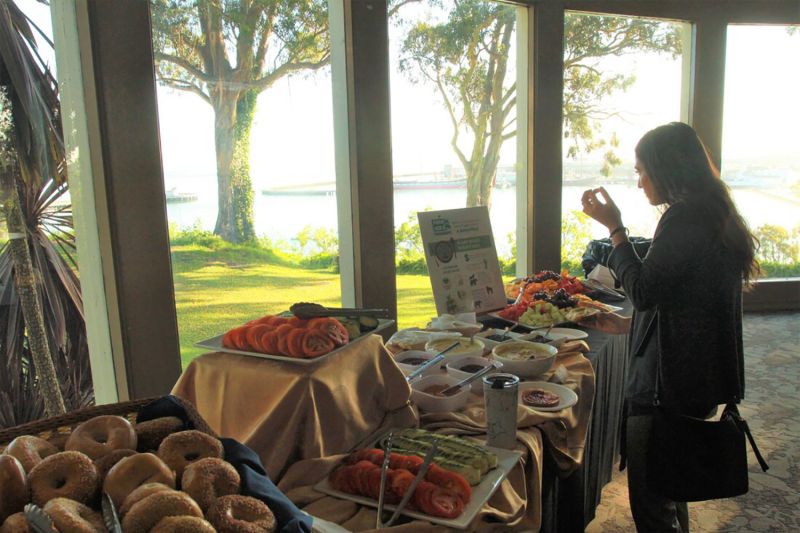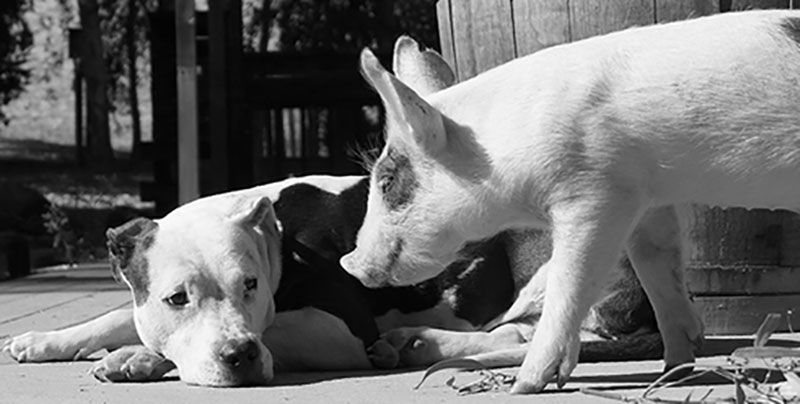Animal-friendly menu policies: It’s a thing that you should do
Making your events more inclusive for all animals
August 7, 2019

How many of us have stopped traffic to help a turtle safely cross the road, or spent hours tracking a stray cat or dog to make sure they were brought to a safe place? If you’ve ever carried an abandoned duckling to the nearest pond in the hopes of reuniting them with their mom, or made a quick U-turn after spotting a young rooster wandering the shoulder of the highway, you just might be an animal advocate.
If you’re here, you probably knew that already!
All of us, day in and day out, sacrifice a bit of our comfort, a lot of our time and perhaps most of our sanity to help any animal we see in need. When faced with the choice of doing something or doing nothing, we, without question, take up the task to save the life of that cat, dog, turtle, rooster or duck.
But what if we aren’t face-to-face with the animal in need? Does that affect our choice about whether or not to act?
All of us (yes, you too!) are making the world a safer and kinder place for animals. Incredible ideas and practices are coming out of animal welfare organizations every day, but there remains a significant blind spot that many organizations choose not to address: the animals who show up on our plates at shelter-sponsored events. We don’t see their suffering when we’re at the event, so how do we know to stop it?
Imagine walking through the buffet line at your shelter’s next fundraiser. Platter after platter heaped high with delicious-looking foods are there for the taking. Now look closer: How many animals do you see on those platters?
In our society, it’s pretty common to see at least three different animal species being offered as food at any given event. However, by keeping animals off the menu, a single 150-person event can spare the lives of up to 50 farmed animals like cows, pigs and chickens.
The Food for Thought Program—a campaign of Animal Place, a nonprofit sanctuary for farmed animals in California—works to address this disconnect within the animal welfare field. We offer resources, consultations and grant opportunities to any organization looking to make the change to more animal-friendly (vegetarian/vegan) food policies.

This year, Food for Thought excitedly embraced the opportunity to participate in the special session “Adopt an Animal-Friendly Food Policy to Save More Lives” at the Humane Society of the United States’ annual Animal Care Expo. We were right alongside animal welfare heroes Stephanie Shain, COO of the Humane Rescue Alliance, and Josephine Morris, food and nutrition specialist for the HSUS’s Food Forward program. The session garnered enormous interest, with nearly 150 attendees pre-registering, and excitement about the topic fueled some great conversations at our exhibition table.
While some people still brush off plant-based menu policies for animal organizations as something for the future, something people aren’t ready to embrace, we found—after speaking to the movers and shakers who are on the ground doing crucial lifesaving work for the animals in their communities every day—that the future is now! I’ve never heard so many self-proclaimed “carnivores” point out the hypocrisy of using animals as food at events to raise money for other animals. These folks had made a variety of choices about what to eat and what not to in their private lives, but they acknowledged that organizations with a mission to save animals should hold themselves to a higher standard and refrain from contributing to any practices that hurt animals.
Another thing we all agreed on was that broadening our organizational scope of compassion to include all animals requires unwavering resolve and persistence, but, in the end, provides tremendously positive rewards that only such a forward-looking policy could garner. Like being a better advocate.
During the session, we discussed the changing climate in the animal welfare community, noting especially the growing trend of plant-based foods; and I included a fun, interactive component where the audience helped craft a menu policy using everyone’s favorite game, Mad Libs! Panelist Josephine Morris presented some eye-opening statistics on farmed animals in the United States, as well as highlighting the work Forward Food is doing with food service professionals and other industries.
Stephanie Shain rounded out the panel with an inspirational real-world overview of the process of adopting a board-approved vegan menu policy. And Food for Thought’s wildlife/environment coordinator Barb Troyer demoed a delicious recipe—check out Barb’s Smoky Okie Vegan Jambalaya recipe!
An animal-friendly policy not only aligns your event menus with your mission of saving animals—it also establishes an alliance with your peers in the animal welfare field. Farm sanctuaries and wildlife rehabilitators are performing the same critical, lifesaving work shelters and rescues are doing; we’re not in competition. We’re all on the same team. Why are we making it harder for each other?
Disrupting the status quo is uncomfortable. Change is time-consuming. We are a species that thrives on instant gratification and positive reinforcement; we want to see our good intentions acknowledged. But I see you! I see your small movements toward more ethical food choices at your events. I see your resolve when a supporter questions the lack of “real meat” at your annual Dog Day in the Park BBQ. I see the smiling faces at your first all-vegetarian or vegan event (which Food for Thought can help fund with our vegan event grant!).
Keep going. Keep this positive momentum moving, ask for help when you need it and consider the Food for Thought team another ally with you on your ever-evolving path of compassionate outreach and best practices.

